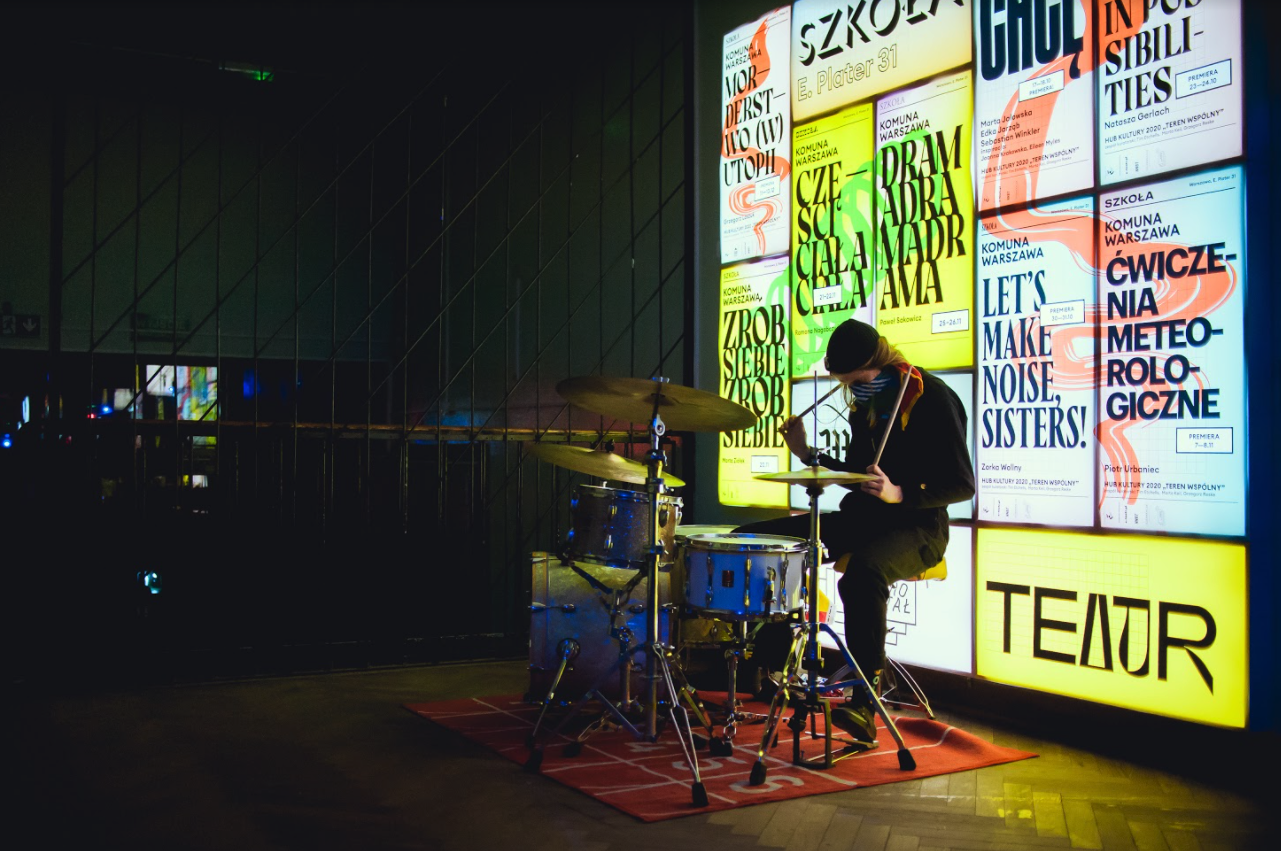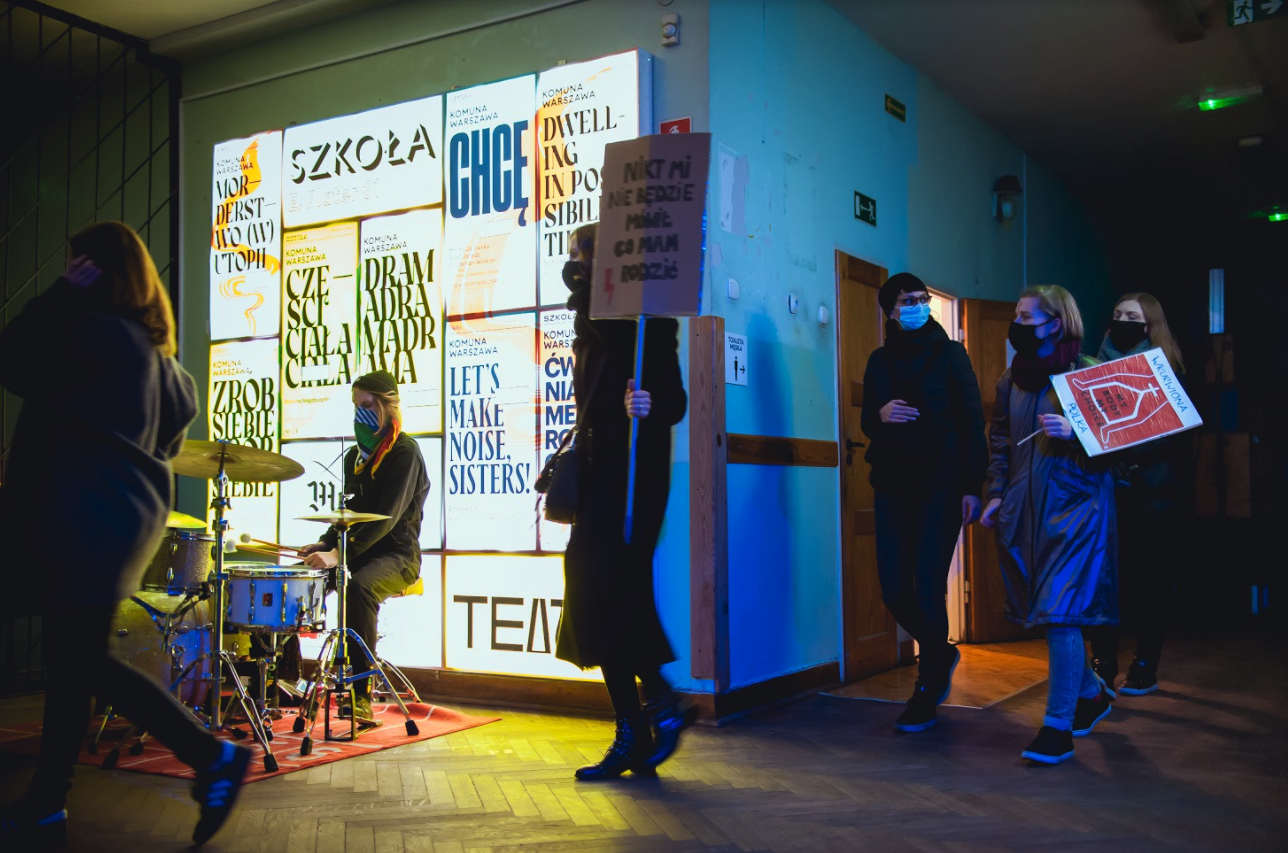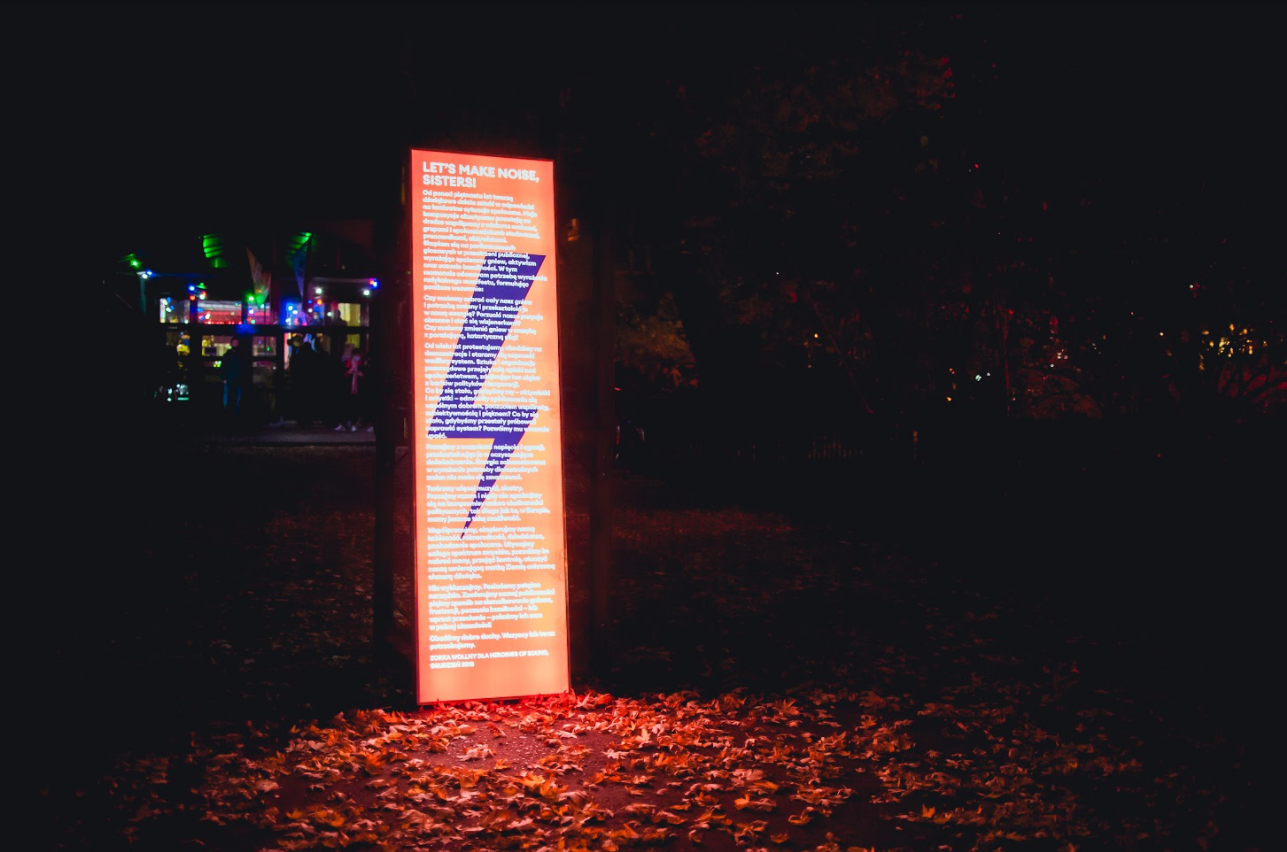Anger, Ritual, Female Power
Tereza Stejskalová in conversation with Zorka Wollny on Art in a Time of Social Unrest


Tereza Stejskalová: Let us start with your newest project, Let’s Make Noise, Sisters!, which just premiered at the Komuna Warszawa Theater in Warsaw on the last day of November. While we had to postpone our performance festival in Prague due to the closure of all cultural institutions during the pandemic, your premiere was still possible in Warsaw. What is different about this project, and in what sense is it continuation of your other, earlier performative projects? It has clearly been taking place under quite extraordinary social circumstances – not only the COVID-19 pandemic but also the nationwide mass protests against anti-abortion laws.
Zorka Wollny: The project had of course already been planned before the crisis erupted. I started working on it in January, and for all this time it has felt good to be surrounded by women and to work with women. I crave this kind of communal feeling, sisterhood, doing things in a circle of women who know each other and collaborate together. It was planned as a meeting between two groups – several women in Warsaw with whom I worked on other, earlier projects and some girls from Berlin from my band Psychedelic Choir. I wanted them to join forces and also shake Warsaw up a bit. We wanted to create a kind of ritual while speaking about our emotions through voice and noise. The crisis was in the air. We were protesting the same shit exactly four years ago. The position of women in Poland has always been precarious. The fight has never been won. The premiere of our performance was right on the day of the biggest demonstration, and it was already clear about a month before that the project would have to refer to it and that anger and frustration would be our basic emotions. Of course, the women in Warsaw were very involved in what was going on, and the women from Berlin were mainly there as supporters. However, because of the pandemic, it was impossible for the two groups to meet in Warsaw, so I was searching for a formula for our collaboration. We created this platform on which we exchanged what we read and our sources of inspiration. Then I encouraged all of the women to start recording themselves and their personal rituals which give them strength. I also encouraged them to really use their own voices. In this way we collected very personal videos of what is empowering for these particular women. Then we started meeting in smaller groups to make videos.
Tereza: Did emotions change during the preparation of the project due to the circumstances? In what ways did the different groups influence the outcome?
Zorka: I found the women from Berlin to be much more liberated, very daring, and more ready to use abstract sounds. They were not so attached to a certain image of woman. The videos by the Polish women referred a lot to giving care – to the role of the one who takes responsibility, who builds something, who puts together something very carefully. They were not so much about someone who destroys or breaks something or makes noise to freely expresses oneself. There was this difference in the beginning. However, while we were working in Warsaw, frustrations were growing, and then the new anti-abortion court ruling came. The tension grew, and it had to be released. Talking about friendship and care and sisterhood, taking care of partners and households and the small things was suddenly not enough. That is when noise and brutal actions came in, but there was also liberation through anger. We shot videos that directly express that anger. The opening took a hybrid form; however, I believe we were also able to squeeze in something positive through the power of music under such complicated and difficult circumstances.
Tereza: Has this situation changed how you think of yourself as an artist? Or did it confirm any ideas or convictions you already had?
Zorka: The demonstrations were happening every day. Every time we finished rehearsing, my performers would go to the demonstrations or they would come to rehearsals from the demonstrations. And all this protest energy mixed with the energy of the piece. At the opening there were also members of the audience who just came from the demonstration to drop by and then went back. And the whole group joined the demonstration later on as well. The whole tense social atmosphere actually gave us strength and power to keep going even under the difficult circumstances of COVID and masks and other restrictions, such as the limited audience. We still had a feeling that we were doing something important and that we were also taking action in our own way. I am not usually the one in the front line of the protests. I am more of an introverted person, but that does not mean I do not have the tools to support protest as well, to be a part of it in my own way. As an artist, I am interested in creating temporary communities – initiating a group of people in the context of a specific place that is going through a transformation at a certain moment in time. I work on the topic that is important for the people at that moment, and they are usually co-authors of the scenario while I bring in the artistic form. Therefore it is related to whatever is going on. It is a reaction to what is in the air. The last project confirmed my ideas about what I as an artist can and should do. It was an invitation to step aside and fall into a parallel reality where all things which had been suppressed gathered to create a kind of dark, black magic world. Anger, ritual, female power – all things that are the motor of the demonstrations now and the motor of what is going on outside – but here you can see it in a compressed form, like a beating heart that is pumping energy to the outside world.
Tereza: You like to work with feminist topics, but do you think you also use feminist methods? What I mean is how you work collectively, how you relate to the other performers, how relationality is at the center of your work… How, more than having a message to deliver, you create conditions for others to express themselves…
Zorka: Feminism cares about connecting people and seeing value in each individual. So, yes, in that sense it is a feminist practice. It is centered on us – on the relation we have with the world and how we relate to ourselves. What I want to give people is a safe space to dig deep into themselves and search for energy and power – which leads them to realize they really have a lot of power. I do not feel self-important enough to be a macho artist. I started to work with people because I had a sort of phobia. Sometimes I get lost in the way society works – its rules. It is better for me when I create a world on my own terms, where people come and join me, and I understand this world. Equality, working together, searching for places where we can collaborate – these are important. Everyone is invited. My practice is based on open calls, and whoever wants to participate can participate. There is never a casting. There is never exclusion. It is always welcoming.
Tereza: For the last project, however, you worked only with women. How did this happen? What was the reason for it?
Zorka: Women are always more interested in my practice. It is usually women who reply to my open calls and who are willing to collaborate. I like to collaborate with men, but right at this moment in my life, I have kind of started to focus more on my female relationships. It came naturally as I have now a female band in Berlin, and it works great. I wanted to connect these great women in Berlin with great ladies in Warsaw with whom I collaborated last year in Biennale Warsaw. Again, that was a project of 40 people, and only 4 of them were men. I said ok, let’s not pretend, and let’s do a project about femininity and about sisterhood. Why not? But if a man came and told me he had something to say about sisterhood, I would surely welcome him too.
Tereza: Female anger is very much at the center of the current protests as well as your project. What is your own personal relation to anger, and what does it mean for you as an artist to work with such an explosive emotion?
Zorka: Female anger is much more suppressed in our culture than male anger, and it is not accepted as an emotion. However, it is one of the important emotions, and if you do not work with it, it can lead to aggression – passive aggression, self-destructive aggression, which can even lead to illness. For me, as a woman who comes from a conservative country like Poland, I know what it is like when you try to be nice all the time and see it as your duty – as if you are not allowed to get angry. But once you get angry, you can discover how much power you actually have. It is one thing to get angry, but the second thing is how you deal with it, how you express it, and what you use it for. Because anger can be used to build positive things, to find your boundaries, and to see where you stand and what is important to you. It is destructive when you do not know how to deal with it or when you decide to use it in an aggressive way, but anger is also an enormous source of power. Maybe women still need to learn how to express it and that it is OK to express it. Sometimes it is good to get angry, and at the moment in Poland it is certainly necessary. Boundaries have been crossed – our physical boundaries, the boundaries of our bodies. Anger is a tool to protect the boundaries that we set. This is me. Do not go any further because then you will hurt me.
Tereza: Do you often think of an emotion when you start to think of a new piece?
Zorka: My performances are about the people who participate in them. The pieces are based on their emotions, fears, and questions they have. Thus, in a very natural way, you have a strong performance because the participants really care about what they are saying, how they talk about it, and what is being expressed. This is why I like to work with “normal” people, not professionals. For professionals it is easier to distance themselves. To be professional actually means you can view your own activity from a distance. Sometimes I have something in my head, a picture, a sound, and I need the help of other people to bring it to life and to inhabit it. It is very nice to have a group of people surrounding you making noises and sounds. It is about their presence. That is why I do not do sound installations. I work with people. Their presence and the fact that it is created at that very moment is very important for me. There is a huge difference between this kind of situation and one in which I just put speakers around you. This kind of human presence expressed through voices always awakens emotions in me. But it all usually starts from a sound or a picture when I close my eyes and I imagine being in a certain space.
Once, after watching a lot of theater and some Hamlet, I was thinking about Ophelia, and I closed my eyes and imagined a park in the winter with a lot of snow, and suddenly I was surrounded by mad women – Ophelias, who were all immersed in their mad monologue. And I thought of how amazing it would be to be in this garden of madness. And this is how I came up with the idea to actually create this performance. We did it in an empty museum, and I worked with twelve actresses who had actually played Ophelia in different theater productions of Hamlet. The trigger for the performance was the question of madness in culture and what form it takes now. What would we call madness today? How does it feel to be surrounded by it?
When I started thinking about this last project, I did not actually think of anger. I was rather thinking about how we can create a feeling that you are not alone, that you are supported. There are many rituals you can do alone as a single woman, but if you do them in a group, you can really feel how powerful we are. It is some kind of good witchcraft created through sound and noise. And then, while working on it, it turned out that many of us happened to be very angry, and this anger was growing, and that is why we started to work with this emotion and why it became the most important thing in the performance.
Tereza: Does it make a difference if you work in Poland or somewhere else, in a different cultural context?
Zorka: I cannot work without emotions. The worst places for me to work are those where life is simply good, and people do not need me. They do not need this channel of a collective piece in order to say something, to express their hidden emotions, hidden needs, fears, frustrations, will, and need for beauty – because their needs are satisfied, and their lives may be a bit boring. It happened to me in some places in Western Europe. The things with which I usually work – these extreme emotions in people – just are not there. Life does not demand that you be opinionated or fight for something or go to extremes. For me it is easier with conflict, activists, issues that people care about, and then we can discuss them in the form of music and change it into a kind of cathartic experience. There are also countries and cultures in which people feel the music more and consider it to be a common way of expressing themselves, and there are countries and cultures which are colder and more restricted, where I have to spend much more time simply encouraging people. You can really do it, you can be louder, you really have a beautiful voice. It is amazing. You are doing great, you have a beautiful text, just deliver it.
Tereza: Now there is one question I of course have to ask. How has the pandemic situation affected your practice?
Zorka: I was working and traveling so much last year that the first lockdown gave me a needed break. I could finally face myself, and not just my work and the people I work with. Of course, as time passes, I am getting more and more worried because my work is to work with people and to meet in person. I need it, and I love it. This is where we generate the most energy, meeting face to face and working together. I really hope it will be possible again soon. I have always worked with performance and communities, and I was always invited for exhibitions when there was a desire for something vocal and performative. I really hope curators will not skip this element now. This form of art has a right to exist.
The text is a part of an ongoing series which aims to introduce the ten artists who will participate in the upcoming festival of performance art We Are All Emotional. The event will take place in May 2022 in Prague.

Image 1 – 3: Zorka Wollny, Let’s Make Noise, Sisters! 2020. Komuna Warszawa, Warszaw, Poland. Courtesy of Komuna Warszawa. Photograph: Pat Mic